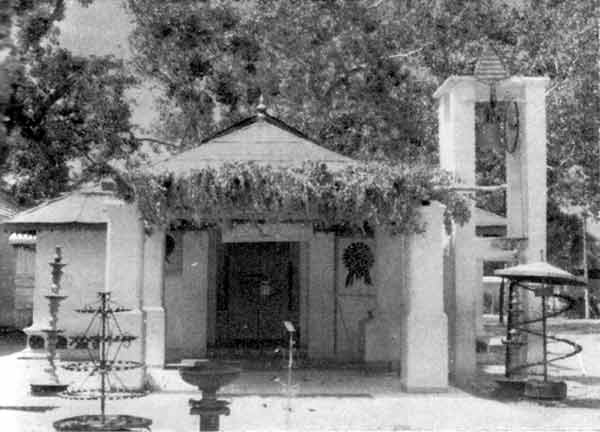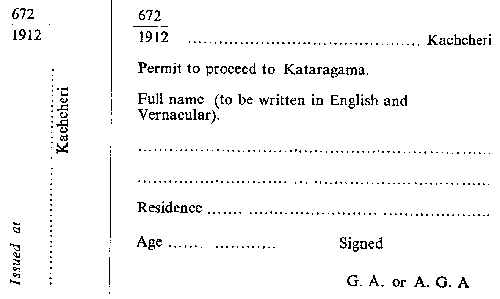
|
|||||||||||||||||||||||||||||||||||||||||||||||||||||||||||||||||||||||||||||||||||||||||||||||||||||||||||||||||||||||||||||||||||||||||||||||||||||||||||||||||||||||||||||||||||||||||||||||||||||||||||||||||||||||||||||||||||
|
| |||||||||||||||||||||||||||||||||||||||||||||||||||||||||||||||||||||||||||||||||||||||||||||||||||||||||||||||||||||||||||||||||||||||||||||||||||||||||||||||||||||||||||||||||||||||||||||||||||||||||||||||||||||||||||||||||||
Kataragama Festival's Colonial Period 'Ticket System' in 1911by Mr. John Scott, Assistant Government Agent, Uva Province, Ceylon
I understand that the restriction of the pilgrims allowed to attend this festival, and the introduction of the ticket system, were the result of repeated outbreaks of disease at the festival times. It does not require more than a few hour's stay here to realise that the ticket system is under present conditions little better than a farce—to regulate, check, and enforce it properly would require a much larger force of police and a far larger expenditure than at present. It is easy for any one to make his way into the camp without a ticket; he has merely to lurk in the jungle till dusk and then slip across the river at some distance from the constable hut. It is of course out of the question to keep continually calling on every man in camp to produce his ticket— consequently anyone without a ticket can move freely about the place without fear of detection. Moreover on the last day of the festival a Buddhist perahera comes over from Tissa 1,000 strong—to worship here at the Kirivehera. They have no tickets, but must be admitted to the camp. Again a large proportion of ticket-holders produce tickets issued in some other name. The names of the ticket holders, by the way are entered on the tickets in English—and 99% of holders cannot read English. Suppose, however, that it were possible to check successfully all tickets and ticket holders, we are then confronted with the problem of how to deal with the transgressors. A small fine is nothing to a pilgrim, if he is allowed to stay in camp after paying it — and there is no means of ensuring his departure from camp. Of course if he returns after being sent off, he is liable to rearrest—but he runs a far better chance of not being rearrested among the hundreds of pilgrims in camp. Again a heavy fine might be paid in some cases—but generally the offender would be unable to pay, and would have to be sentenced to imprisonment—but there is no jail or lock up here—and no means of enforcing hard labour; I have indeed had two cases in which accused could not pay fines—and I have sent them for work at scavenging for 2 or 3 days; but I have no means of keeping them at work—and they could decamp whenever they liked. I think then one cannot help concluding that the ticket is somewhat of a farce. I would do away with it altogether—and let any number of pilgrims come here—just as to the other big pilgrimages of St. Anne and Madhu. These pilgrimages are a great success—and there are no outbreaks of sickness there—then, why should there be here?
I say there is no reason why epidemics or disease should occur at Kataragama if proper precautions and sanitary measures are taken. Judging by the steps taken in this direction here this year, I would say that sanitary measures and precautions here have been hitherto totally inadequate—and I would ascribe the former outbreaks of disease here entirely to that inadequacy. Greater precautions require a greater expenditure, of course; then without hesitation I would recommend the spending of more money on this pilgrimage; money is spent lavishly enough on the other two big pilgrimages; why not on this? In this connection, I wonder if Government would have anything to say to a proposal to levy a pilgrimage tax or fee to defray the cost of scavenging, medical service, etc. It is rather a startling proposal perhaps—but I think it worth pausing over. The pilgrims (presumably) are those who benefit from the pilgrimage—not Government—at any rate; it doesn't seem unreasonable, therefore, that those benefited should contribute towards the preservation of their own health especially when it is the fact of their congregating in such large numbers that endangers their health. The fee I would suggest would be 10 cents a hand, irrespective of age or condition so small a fee could scarcely be called a hardship—and would hardly be worth deliberate evasion; and I believe the sum so collected would pay all expenses incurred by Government at each pilgrimage; (for I would introduce the tax at each of the 3 big pilgrimages); St Anna attracts over 30,000 persons, I believe—and Madhu about 25,000; and I hear that almost as large numbers as these used to attend this festival before the restrictive policy was introduced. 104 cases were tried by me as Police Magistrate for infringement of the rules drawn up for the regulation of the pilgrimage; 66 persons were fined for bringing cattle into the camp; 26 for entering camp without tickets and 9 for committing nuisance. The following table shows the number of tickets produced by pilgrims on each day of the festival, and the place of issue of the tickets:
|

